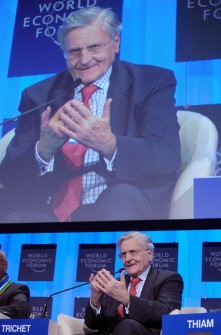
FRANKFURT, Jan 31, 2010 (AFP) - European Central Bank policymakers will confront mounting eurozone financial tensions at a meeting Thursday in the face of a brewing crisis brought on by Greece's spectacular public deficit and debt.
That the ECB's main interest rate will stay unchanged at a record low of one percent is considered a done deal for most, if not all, of 2010, analysts say.
Although headlines are being grabbed by Athens and its deficit of 12.7 percent of gross domestic product and debt of roughly 113 percent of GDP, other eurozone countries have serious problems too.
Italy, whose economy represents a much bigger portion of the 16-nation eurozone, has debt equivalent to 115 percent of output, also nearly twice the accepted eurozone limit of 60 percent.
Portugal's public deficit last year was 9.3 percent of GDP meanwhile, more than three times the eurozone ceiling of 3.0 percent, and Spain has estimated its shortfall at 11.4 percent.
On Friday, the Spanish government unveiled an austerity plan to save 50 billion euros (70 billion dollars) over three years, while Ireland has also drafted a a drastic fiscal programme that includes public sector pay cuts.
Analysts do not expect any country to leave the eurozone, but they are worried about a widening growth gulf between northern and southern European countries.
Investec securities analyst David Page said his firm anticipated "ongoing tensions that are beyond the scope of eurozone monetary policy to address."
Support for Greece is reportedly under consideration, but the German foreign ministry has said that "Greece has the duty to live up to its responsibility for the eurozone's stability by its own means."
French Finance Minister Christine Lagarde told CNBC television at the World Economic Forum in Davos, Switzerland however that "Greece is not alone."
EU rules prohibit direct bail-outs but eurozone neighbours could extend bilateral loans to see Athens through its crisis, though that might undermine the credibility of criteria that underpin the single currency.
The euro has fallen as a result of the crisis, and hit a six-month low on Friday of 1.3913 dollars in London trading.
Indicators of eurozone economic health send contrasting signals meanwhile.
Overall economic confidence rose for a 10th month running in January, the European Commission said, but consumer confidence was just slightly better, because companies do not plan to start hiring in the near future and government spending has left populations wondering when they will have to pay the bill.
"Deteriorated labour market conditions combined with fiscal consolidation will probably weigh on private consumption," Deutsche Bank economist Gilles Moec said.
One in 10 workers across the eurozone is unemployed, EU data shows, while the rate in Spain is nearly one in five.
Partly as a result, inflation remains at a relatively tame 1.0 percent, even though the Greek crisis has caused the euro to fall against the dollar, raising the cost of imported commodities and energy.
Elsewhere, the ECB's latest bank lending survey determined that credit to households had improved but businesses faced tough conditions that could harbour "some tentatively unpleasant developments in the remainder of 2010," Moec said.
"Supply side constraints could kick in exactly at the time when the funding needs of the corporate sector start to rise" while banks fret about possible loan defaults, he explained.
In London, the Bank of England will also meet this week to mull changes to interest rates and exceptional measures taken to spur growth, with economists forecasting no change to the record low rate level of 0.50 percent.
























